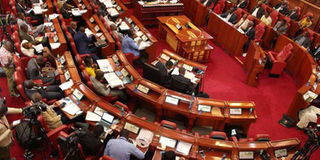Adoption of law reverses a decade-long policy stand

Senators debating the Election (amendment) Laws Bill, 2016 at Parliament Buildings on January 3, 2017. PHOTO | DENNIS ONSONGO | NATION MEDIA GROUP
What you need to know:
- Kenya went into elections in 2013 with the IEBC under immense political pressure to deliver the elections based on technology.
- The central problem that the negotiation between Jubilee and Cord was meant to address was the lack of trust in the IEBC.
The reference point in the debate on the use of technology in the management of Kenya’s elections is the Kriegler report which recommended that “ECK start having developed an integrated and secure tallying and data transmission system, which will allow computerised data entry and tallying at constituencies, secure simultaneous transmission (of individual polling station level data too) to the national tallying centre, and the integration of this results-handling system in a progressive election result announcement system”.
Because the ECK was disbanded at the end of the Kriegler process, the responsibilities of implementing this recommendation ended up residing on its eventual successor, the IEBC, which the Constitution of 2010 established.
The Elections Act, the legislation to give effect to the expansive constitutional provisions on elections, was then enacted in 2012, and included a provision empowering the Commission to “use such technology as it considers appropriate in the electoral process”.
A further provision stipulated that the IEBC may make regulations that would “prescribe the facilities to be provided during the electoral process and, in particular, for voting by electronic machines and the persons entitled so to vote and the circumstances in which persons may so vote.”
Because of the specific trauma that the country still faced after the 2007 elections, Kenya went into elections in 2013 with the IEBC under immense political pressure to deliver the elections based on technology.
Understandably, at all material times, the IEBC represented that the 2013 elections would be managed with the aid of technologies.
The first indication that technologies would not necessarily be deployed was when the laptop computers that had been supplied for use in the identification of voters started failing around the country, as the batteries ran out of charge.
Inevitably, the IEBC was forced to refer to printouts of the registers that had been supplied.
MISTRUST
The next failure occurred during the transmission of results, the IEBC declaring that its server had crashed and that the tallying that was supposed to be electronic would now be replaced with a manual tallying of the Form 36 in the presidential elections.
In the period after the 2013 elections, the IEBC has consistently portrayed these failures as minimal and of no consequence, asserting that the failures were adequately addressed by manual alternatives.
The IEBC was able to do this because the law requiring the use of electronic devices was permissive and allowed the elections body to choose whether or not to technologies.
The Joint Select Committee seems to have been responding to the permissive nature of the law when it produced a more prescriptive set of requirements on what technologies may be used in this year’s elections.
While Jubilee played along and agreed to this more detailed law, the ruling coalition thereafter changed its mind and brought the amendments that have now introduced room for complimentary mechanisms to electronically-driven elections.
The adoption of this law reverses a decade-long policy stand promoting the use of technology in elections and significantly undermines the Jubilee Government’s self-regard as a digital government.
One of the grounds on which the 2013 presidential election results were attacked was over the failure of the technologies on which accountability for the results was understood to have hinged.
However, the Supreme Court agreed with the argument by IEBC that technologies can fail and dismissed this ground of attack.
The effect of the Jubilee-sponsored amendments is that they give the IEBC the room to deploy whatever complimentary alternatives that will be of its liking.
The IEBC, which has in the past shown a large capacity to chop and change as the situation required, will have exactly the same freedom in the coming elections.
The central problem that the negotiation between Jubilee and Cord was meant to address was the lack of trust in the IEBC.
MUDDIED CREDIBILITY
By imposing its will so strongly, Jubilee has left little room for the views of the IEBC to be ascertained.
The perception that Jubilee and the IEBC have a secret understanding over which they are united in opposing the use of technologies in the forthcoming elections will not improve stakeholder confidence in the IEBC, or the credibility of the elections.
Cord has called a meeting of its supporters next week during which it says a position will be taken about these amendments.
It is likely that Cord will reject the amendments.
If that happens, the country will be left with two choices. First, there may then be a new attempt to negotiate with Cord.
Secondly, Jubilee could decide to go ahead with the elections on the basis of the law that has been worked out.
At that further point, Cord will have two choices, the first to participate in the elections anyway and the second to boycott them.
Ideally, the country should avoid these imponderables.
Jubilee’s legitimacy was already frayed from the time they took power.
There is a minimum level of credibility below which another term in office would be a nightmare for Jubilee, and the country.
The anger and frustration that large sections of the population already feel as a result of being hectored by Jubilee at every turn could boil over and the country could face significant instability all over again.
While, initially, the debate about the role of technology in the next elections was about efficiency and accountability, it has now also become a matter of pride for the opposition and their supporters. Jubilee’s conduct has made it so.





